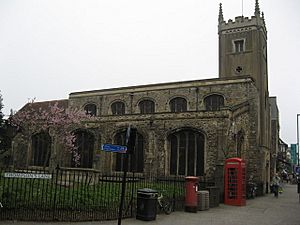St Clement's Church, Cambridge facts for kids
Quick facts for kids St Clement's Church, Cambridge |
|
|---|---|
 |
|
| 52°12′33″N 0°07′05″E / 52.2091°N 0.1180°E | |
| Location | Bridge Street, Cambridge, Cambridgeshire, CB2 1UF |
| Country | England |
| Denomination | Church of England |
| Churchmanship | Prayer Book Catholic |
| History | |
| Status | Active |
| Architecture | |
| Functional status | Parish church |
| Heritage designation | Grade II* listed |
| Specifications | |
| Bells | 6 (English Change Ringing) |
| Tenor bell weight | 6–1–11 |
| Administration | |
| Parish | St Clement, Cambridge |
| Deanery | Cambridge North |
| Archdeaconry | Archdeaconry of Cambridge |
| Diocese | Diocese of Ely |
St Clement's Church is an old and important Church of England church in the middle of Cambridge, England. It is a special building because it is listed as a Grade II* heritage site. This means it is a very important historical building.
Contents
Where is St Clement's Church?
The church is on Bridge Street, Cambridge, which is a historic part of central Cambridge. Its churchyard is like a peaceful green space in the busy street. Many old buildings are in this small area, including the Old Vicarage, which is right next to the churchyard.
A Look at the Church's History
How the Church Was Built
The church you see today was built a long time ago, in the early 1200s. People believe it stands on the same spot where an even older church once was. The walls are made of stone and some brick. Parts of the church, like the main hall (nave) and the South door, are still from the 13th century.
In 1278, a list of items owned by the church was made. Later, in the 1300s, some parts of the church were rebuilt. An eight-sided font, used for baptisms, was added. In 1538, more changes were made. The windows were added, and the side aisles were rebuilt and made wider.
Changes Over the Years
The current chancel, which is the part of the church near the altar, was built in 1726. It replaced an older one that was taken down in 1568. Inside, there is a beautiful painting from 1872 on the east wall. It shows Jesus in glory, surrounded by angels and saints.
The church tower was added in 1821–22. It was designed by Charles Humfrey and first had a tall, pointed top called a spire. However, this spire was removed in 1928. A small room called a vestry was built in 1866. In 1933, a special chapel was created in the south aisle.
Oldest Memorials and Records
St Clement's has the oldest memorial for a Mayor of Cambridge. It is a tombstone for Eudo of Helpringham, who passed away in 1329. He was mayor six times! The French writing on his tombstone shows an early version of the name "Cambridge."
In the north aisle, there is a carved wooden beam from around 1538. It has a clever message that suggests Thomas Brakyn helped pay for the church's costs. He lived in the area and is buried in the churchyard. The church's official records, like those for births and deaths, started in 1560.
Church Life and People
Important Leaders of the Church
One important leader of St Clement's was Canon Edmund Gough de Salis Wood. He worked at the church from 1865 to 1930, first as a curate and then as the vicar. He lived in the Old Vicarage and was buried in the churchyard. He was known for following traditional worship practices. He also wrote books about church law. The chapel in the south aisle is a memorial to him.
After Canon Wood, Fr James Tait Plowden-Wardlaw became the vicar from 1931 to 1941. He continued the traditional style of worship. He often wrote books under the names 'Father Clement' or 'Clement Humilis'. Another vicar, Fr Cuthbert Cubitt Keet, was an expert on the Psalms.
St Clement's Today
For many years, starting in 1968, a Greek Orthodox church used St Clement's. They later moved to their own church. Today, St Clement's is home to the Parish of St Ephraim the Syrian, which is an English-speaking Russian Orthodox church.
In December 2013, a plan was approved to help the church grow and become stronger. A new priest, Canon Nick Moir, was appointed in June 2014. The church is working to improve and continue its traditional worship. In 2016, the church received a grant of £94,000 to help with repairs, as it was on a list of heritage buildings at risk.
In 2022, a group called the Society of Cambridge Youths installed a new set of bells at the church. This means the church now has bells that can be rung in a special way called "change ringing."
Past Clergy
- Laurence Chaderton
- William Cowie
- Lionel Gatford
- Arthur Ward
- James Tait Plowden-Wardlaw
 | Bessie Coleman |
 | Spann Watson |
 | Jill E. Brown |
 | Sherman W. White |



